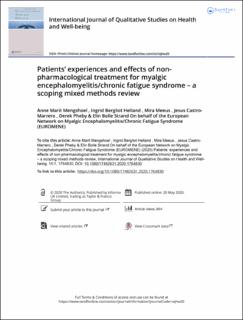| dc.contributor.author | Mengshoel, Anne Marit | |
| dc.contributor.author | Helland, Ingrid B | |
| dc.contributor.author | Meeus, Mira | |
| dc.contributor.author | Castro-Marrero, Jesus | |
| dc.contributor.author | Pheby, Derek | |
| dc.contributor.author | Strand, Elin Bolle | |
| dc.date.accessioned | 2021-02-16T11:22:53Z | |
| dc.date.available | 2021-02-16T11:22:53Z | |
| dc.date.created | 2020-05-23T18:42:14Z | |
| dc.date.issued | 2020 | |
| dc.identifier.citation | International Journal of Qualitative Studies on Health and Well-being. 2020, 15 (1), 1-16 | en_US |
| dc.identifier.issn | 1748-2623 | |
| dc.identifier.uri | https://hdl.handle.net/11250/2728339 | |
| dc.description.abstract | Purpose: The EU COST Action 15111 collaboration on myalgic encephalomyelitis/chronic fatigue syndrome (ME/CFS) aims to assess current research and identify knowledge gaps in Europe. Presently, our purpose is to map the effects of non-pharmacological therapies (NPTs) for ME/CFS, and what patients find important in the treatment process.
Methods: A scoping mixed methods literature review of European studies identified 16 papers fulfiling our inclusion criteria. The quantitative and qualitative studies were synthesized separately in tables. Additionally, extracts from the qualitative studies were subjected to translational analysis.
Results: Effect studies addressed cognitive behavioural therapy (CBT, n = 4), multimodal rehabilitation (n = 2) and activity-pacing (n = 2). CBT reduced fatigue scores more than usual care or waiting list controls. The effects of rehabilitation and activity-pacing were inconsistent. The contents, assessment methods and effects of rehabilitation and activity pacing studies varied. For patients, health professionals’ recognition of ME/CFS and support were crucial, but they expressed ambiguous experiences of what the NPTs entail.
Conclusions: Methodological differences make comparisons across NPTs impossible, and from a patient perspective the relevance of the specific contents of NPTs are unclear. Future well-designed studies should focus on developing NPTs tailored to patients’ concerns and evaluation tools reflecting what is essential for patients. | en_US |
| dc.language.iso | eng | en_US |
| dc.publisher | Taylor & Francis | en_US |
| dc.relation.uri | https://www.tandfonline.com/doi/full/10.1080/17482631.2020.1764830 | |
| dc.subject | non-pharmacological treatments | en_US |
| dc.subject | patient experiences | en_US |
| dc.subject | effect | en_US |
| dc.subject | rehabilitation | en_US |
| dc.subject | exercise | en_US |
| dc.subject | activity pacing | en_US |
| dc.subject | cognitive behavioural therapy | en_US |
| dc.subject | chronic fatigue syndrome | en_US |
| dc.subject | systematic literature review | en_US |
| dc.subject | Myalgic encephalomyelitis | en_US |
| dc.title | Patients’ experiences and effects of non-pharmacological treatment for myalgic encephalomyelitis/chronic fatigue syndrome – a scoping mixed methods review | en_US |
| dc.type | Peer reviewed | en_US |
| dc.type | Journal article | en_US |
| dc.description.version | publishedVersion | en_US |
| dc.rights.holder | Open Access | en_US |
| dc.source.pagenumber | 1-16 | en_US |
| dc.source.volume | 15 | en_US |
| dc.source.journal | International Journal of Qualitative Studies on Health and Well-being | en_US |
| dc.source.issue | 1 | en_US |
| dc.identifier.doi | 10.1080/17482631.2020.1764830 | |
| dc.identifier.cristin | 1812250 | |
| dc.relation.project | COST (European Cooperation in Science and Technology): EU kode | en_US |
| cristin.ispublished | true | |
| cristin.fulltext | original | |
| cristin.qualitycode | 1 | |
